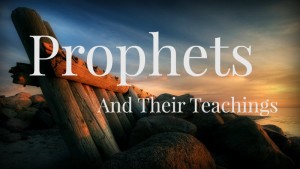I was sitting in Gospel Principles class and the topic was obedience. The conversation quickly turned from obedience to blind obedience, and my wheels started to spin. What is the difference between obedience and blind obedience? If there is virtue or power in obedience, can there be any power or advantage in blind obedience?
Let’s look at the first instance in the scriptures where someone is asked to be obedient to the Lord without knowing the reason for that obedience. This is obedience for the sake of obedience. This is Moses 5:5 – 6. Adam and Eve have been expelled from the garden and are setting up shop as mortals. The Lord is giving them a basic set of commandments to live by.
And he gave unto them commandments, that they should worship the Lord their God, and should offer the firstlings of their flocks, for an offering unto the Lord. And Adam was obedient unto the commandments of the Lord.
And after many days an angel of the Lord appeared unto Adam, saying: Why dost thou offer sacrifices unto the Lord? And Adam said unto him: I know not, save the Lord commanded me.
Someone in the class said that we need to be careful about blindly obeying the commandments. After all, “it is impossible for a man to be saved in ignorance.” (D&C 131:6) To just “blindly” obey commandments, without ever knowing why you are obeying them does you no good.
On the surface, this sounds reasonable, but something struck me as odd. It didn’t fit with how I was feeling when those words were spoken. Was Adam really “blind?” Was he really and truly ignorant of what he was doing? Then it dawned on me that he wasn’t blind at all. Adam knew God. He knew His personality. He had memory of his experiences with deity in the garden before the fall. He may not have known the exact reason for the commandment he was given to offer sacrifices, but he certainly wasn’t blind in his obedience.
Adam knew the person he was talking to. He trusted the Lord. He had already made one choice in the garden and had learned first hand how a big consequence can come from a seemingly simple choice. He knew enough about God to know that if asked to do something, even when he didn’t understand why he was being asked to do it, he was better off obeying than not obeying the Lord.
Adam and Eve obeyed in faith, but not in ignorance. Faith is believing in something that is true, but which you cannot see, believing the promises of the Lord will be fulfilled despite your current lack of knowledge. Isn’t this the same principle we are asked to exercise when we are first asked to pay our tithing?
In fact, isn’t this the same basic principle we are asked to exercise with each and every commandment? Isn’t the promise from the Lord for all commandments that we must first exercise faith in Him before He will reveal the promised blessing? In Ether 12:6 we read:
And now, I, Moroni, would speak somewhat concerning these things; I would show unto the world that faith is things which are hoped for and not seen; wherefore, dispute not because ye see not, for ye receive no witness until after the trial of your faith.
All commandments are given in the beginning as a test of faith. It is only after we have shown obedience to the Lord that the knowledge, the life-changing experiences, and the witness of the truthfulness of what we have been promised is verified by the Lord.
Once Adam had demonstrated that He trusted the Lord by obeying the commandment he had been given, he finally received an explanation. But note that he had to wait a sufficient period of time (many days) before the Lord gave him the explanation he needed to truly understand what he was doing. Adam needed to prove to himself, and to the Lord, that he would be faithful, even without full disclosure by the Lord up front of all the reasons for the request. It is a trust factor.
Adam demonstrated his faith in the Lord by being obedient. The witness, or confirmation of his faith came with the angel who asked him why he was offering sacrifice. Here is Moses 5:7 – 10:
And then the angel spake, saying: This thing is a similitude of the sacrifice of the Only Begotten of the Father, which is full of grace and truth.
Wherefore, thou shalt do all that thou doest in the name of the Son, and thou shalt repent and call upon God in the name of the Son forevermore.
And in that day the Holy Ghost fell upon Adam, which beareth record of the Father and the Son, saying: I am the Only Begotten of the Father from the beginning, henceforth and forever, that as thou hast fallen thou mayest be redeemed, and all mankind, even as many as will.
And in that day Adam blessed God and was filled, and began to prophesy concerning all the families of the earth, saying: Blessed be the name of God, for because of my transgression my eyes are opened, and in this life I shall have joy, and again in the flesh I shall see God.
The Nature of the Lord’s Instruction
I agree with the comment made in class that we would be fools to just blindly obey commandments like robots. After all, that kind of obedience doesn’t produce knowledge, just empty action. There are two types of “blind” obedience, the robotic kind that produces nothing worthwhile to the soul, and obedience based on trust in the Lord, which produces faith and spiritual power. The Lord wants all of our actions to be purposeful and meaningful. When we learn something we learn it a little at a time. This is done on purpose.
In 2 Nephi 28:30 the Lord teaches us how He wants us to learn.
For behold, thus saith the Lord God: I will give unto the children of men line upon line, precept upon precept, here a little and there a little; and blessed are those who hearken unto my precepts, and lend an ear unto my counsel, for they shall learn wisdom; for unto him that receiveth I will give more; and from them that shall say, We have enough, from them shall be taken away even that which they have.
Learning wisdom is something that is done over time. Wisdom is not a fact that can be read and known. Wisdom is knowing when and how to use or not use the knowledge you already possess. The Lord makes us work with His commandments and struggle with them so we come to understand and appreciate them for what they are, laws of happiness. But we have to come to that realization on our own. If we don’t, if He just tells us that the commandments are just laws of happiness then we have no sense of appreciation for them.
Gratitude for the laws of God and for what they do for us comes from living them, working with them, using them, and gaining a sense of appreciation for the power that is in them. And there is certainly power in living the commandments. But that power is something we have to discover on our own.
So back to my initial question, the title of this article, is there virtue in blind obedience? I believe that blind obedience, obedience that is without purpose, carried out without hope for understanding, is a waste of time to the soul. It may get a project completed by your boss, but the Lord certainly does not ever want us living this way.
If by blind obedience we mean exercising faith, and having time to work out the purposes of the Lord’s instructions, learning wisdom along the way, then yes, that kind of obedience, though it appears to be blind is most beneficial. Obedience is the first law of heaven, and as such holds an important place in our arsenal of learning tools to become like God.
We may start out blind, but the Lord never expects us to stay sightless. The whole reason our faith is tested is to open our eyes and give us sight, to increase our understanding, and to help us appreciate the happiness He has in store for us.
About Kelly P. Merrill
Kelly Merrill is semi retired and writes for https://gospelstudy.us. He lives with his wife in Idaho. His strength is being able to take difficult to understand subjects and break them down into understandable parts. He delights in writing about the gospel of Christ. Writing about the gospel is his personal missionary work to the members of the Church and to those of other faiths who are wanting to know more about Christ's gospel and His Church.











To me, obedience to God is not blind obedience at all, but a commitment to follow our Father in Heaven in full faith.